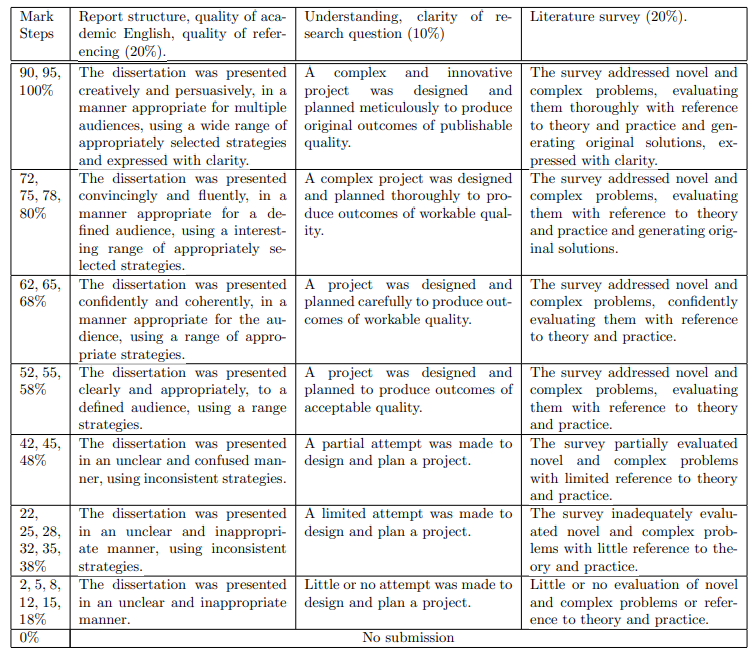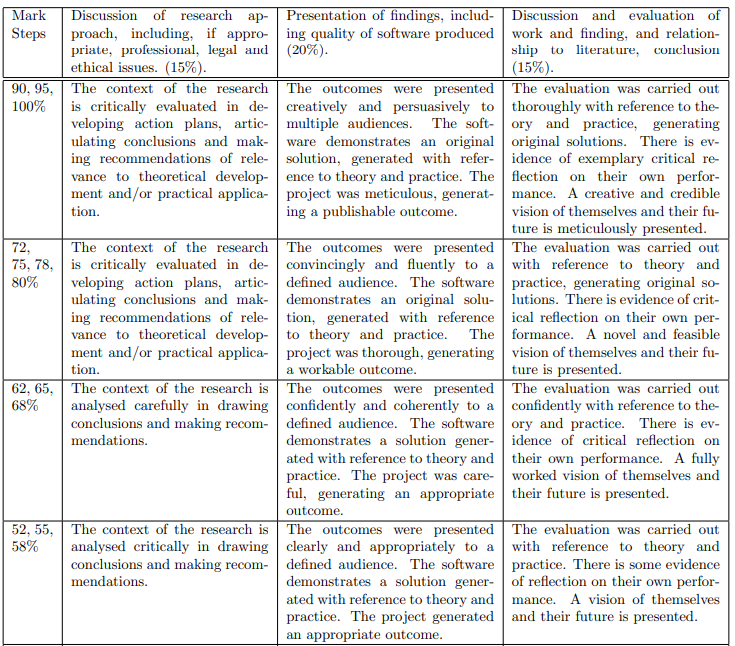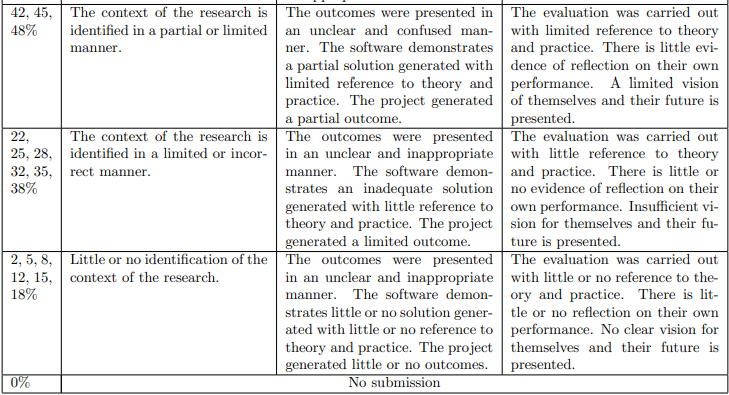| Category | Assignment | Subject | Management |
|---|---|---|---|
| University | Manchester Metropolitan University ( MMU) | Module Title | 6G7V0007 Masters Project |
| Assignment Title: | Dissertation |
| Count words: | 10,000 - 15,000 words, and should not normally exceed 20,000 words |
| Type: | Individual |
This assignment will assess your ability to:
Plan and carry out a programme of research or design work using methods appropriate for your degree, involving experimentation and/or implementation;
Note: it is your responsibility to make sure that your work is complete and available for marking by the deadline.
Make sure that you have followed the submission instructions carefully, and your work is submitted in the correct format, using the correct hand-in mechanism (e.g., Moodle upload). If submitting via Moodle, you are advised to check your work after upload, to make sure it has uploaded properly. If submitting via OneDrive, ensure that your tutors have access to the work. Do not alter your work after the deadline. You should make at least one full backup copy of your work.
The timeliness of submissions is strictly monitored and enforced.
All coursework has a late submission window of 7 calendar days, but any work submitted within the late window will be capped at 50%, unless you have an agreed extension. Work submitted after the 7-day late window will be capped at zero unless you have an agreed extension. See ‘Assessment Mitigation’ below for further information on extensions. Please note that individual tutors are unable to grant extensions to assessments.
If there is a valid reason why you are unable to submit your assessment by the deadline you may apply for assessment mitigation. There are two types of mitigation you can apply for via the module area on Moodle (in the ‘Assessments’ block on the right-hand side of the page):
Further information about Assessment Mitigation is available on the dedicated Assessments page: Manchester Metropolitan University
Are You Looking for Answer of 6G7V0007 Assignment Dissertation
Order Non Plagiarized AssignmentThe Project unit has a single piece of work, an exercise to specify, investigate and solve (through the implementation of a product) an agreed problem. This is assessed through two elements; the Dissertation and Viva. The latter element provides students with an opportunity to explain their achievements in person. The requirements and procedures for Project as a whole, and its constitute parts are set out in a separate document (the “Project Handbook”); this document describes the marking criteria for the Dissertation.
The following is a short, indicative, descriptions of the characteristics of the components of this element of assessment.
In each case, longer descriptions are given in the Project Handbook.
The Dissertation must have the project’s Terms of Reference and included with it, as an appendix. The Ethics Approval number must be stated as part of the originality declaration. Failure to do so will be treated as evidence to of an attempt subvert the University’s Research Ethics and Governance regulations and will be treated appropriately.
Final submission will occur on the evening of Friday 29/08/25, at 21:00. By that point, you must have uploaded your Dissertation materials onto Moodle. Work uploaded after this time will be treated in accordance with the University regulations. Some students may be given an additional period to complete their project, as a consequence of a Personal Learning Plan, or a delayed deadline, as a consequence of Evidenced Extensions.
File names All of the documents you submit should be PDFs and follow a consistent naming convention. They should be identified by your full name, University Identity number and the type of content they contain, in the form: Surname_Firstname_UID_Dissertation. Thus Nicholas Costen, UID 01900261, would in upload a document named Costen_Nicholas_01900261_Dissertation.pdf.
Feedback Formative feedback will be given informally in the supervision sessions, and also formally on the various components. This will occur through Moodle and subject to the normal four-week feedback deadlines.
The Dissertation will be assessed relative to a set of independent features which will be contained within it. They have the following detailed descriptions, which include the relevant BCS criteria.
The specialist (other than the MSc Computer Science) degrees have additional criteria to the generalist (MSc Computer Science) degree, but the aspects are the same. The criteria can be found in the BCS accreditation documentation.
And also critical evaluation of the work in the light of research at the forefront of the domain. This should include a self-critical evaluation of effectiveness and a sense of vision about the discipline, including opportunities for innovation. This will be based on comprehensive knowledge of mathematics, statistics, natural science and engineering principles, informed by a critical awareness of new developments and the wider context of engineering. This will involve consideration of applicable health and safety, diversity, inclusion, cultural, societal, environmental and commercial matters, codes of practice and industry standards (BCS criteria generalist 2.1.1, 2.1.11, 2.1.12, 2.2.5, 2.3.2, 3.1.1, 3.1.2, specialist 3.2.1, 3.2.3, 3.3.3, M1, M2, M4, M5).
Buy Answer of This Assignment & Raise Your Grades
Order Non Plagiarized AssignmentThe criteria are designed to align with the University’s graduate outcomes. These are:
The criteria for different levels of success in the Project are given in the next two pages. Note that the columns are independent, so different boxes may apply to the various components of the overall mark.
This assignment brief also covers re-assessment. Should a student be determined by the examiners to have failed to meet the pass mark for this assignment (this is 50% overall), they will, in completing the free-text assessment feedback, provide a list of aspects of the assignment which need to be amended to reach the 50% level. Should a student fail to submit the assignment, a mark of zero will be recorded and no feedback given. The feedback will include a recommendation on the nature of the re-assessment process. Deadlines for reassessment of Projects are usually flexible, being set in the light of the examination board dates and a need to maximize the probability of a speedy pass by the student.



Get the Solution of This Assignment. Hire Experts to solve this assignment Before your Deadline
Order Non Plagiarized AssignmentFacing challenges with your 6G7V0007 Masters Project Assignment - Dissertation? Well! Stop worrying now. You are at the right place. Our platform provides assignment help. We have experienced writers who provide high-quality, no-plagiarism assignments with 100% original content, and we are assured that our Dissertation Writing Services in the UK will make you productive and help you achieve high grades in your academic year. And we also provide free assignment samples that content have written by the phd expert writers Contact us now!
Hire Assignment Helper Today!
Let's Book Your Work with Our Expert and Get High-Quality Content
